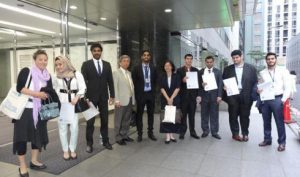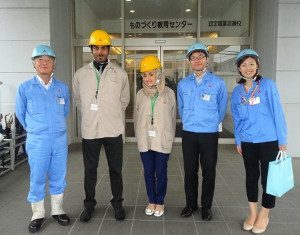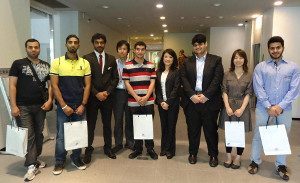JICE Internship Takes Seven Emirati Students on Site Visits to Projects Incorporating Landmark Smart Grid, Solar Power and CCS Technologies
Abu Dhabi-UAE: 17 July, 2013 – Solar power, carbon capture and sequestration (CCS) and smart grids are no new terms to students of Masdar Institute of Science and Technology. However, what the select seven UAE national students in Japan are currently being exposed to could be positively termed ‘innovative sustainable technologies’.
The students from four Master’s programs are participating in an internship program coordinated by Japan International Cooperation Center (JICE). The second annual program that runs from 18 May – 19 July is supported by the Japan’s Ministry of Economy, Technology and Industry (METI).

Mohamed Al Musharrekh and Iman Ustadi are interning with Mitsubishi Heavy Industries, LTD, (MHI), while Abdulla Al Shammari is doing his internship at Chiyoda Corporation. JGC Corporation is hosting Jasem Al Hammadi and Majed Al Marzouqi, while Hitachi, Ltd., Infrastructure Systems Company has Hasan Alhashmi for the program. Ahmed Mukhayer is spending the summer interning with Mitsubishi Electric Corporation.
Iman Ustadi, Research Assistant in Engineering Systems and Management Program, interns with Mitsubishi Heavy Industries, LTD, (MHI). Ustadi said, “The experience is beneficial, offering me a profound exposure to the latest technologies in various sectors of energy, waste and renewables. We were also lucky enough to visit MHI’s power, CO2 and waste-to energy plants located at different prefectures in Japan.”
 Ustadi’s internship on waste-to-energy includes lectures, visits to plants in different regions of Japan, in addition to some technical and informative discussions with experts in the field.
Ustadi’s internship on waste-to-energy includes lectures, visits to plants in different regions of Japan, in addition to some technical and informative discussions with experts in the field.
As part of the program, Majed Saeed Al Marzouqi visited a photovoltaic plant located in Oita City and the JGC laboratory located in Ueno City. As an intern, he is acquiring knowledge in the latest technologies in the fields of carbon capture, energy saving, and building of smart communities.
Al Marzouqi says: “I believe the internship will make a huge difference for me academically. I have learnt two new technologies – one used for CO2 capture and the other for Concentrated Solar Power (CSP). JGC produces a new membrane for capturing CO2 called HiPACT, designed jointly with Germany’s BASF. The advantages include reduction in compression and capture of energy as well as drop in capture and compression costs. The reduction of CO2 recovery cost is estimated around 25%-35%. On the other hand, the JGC-designed parabolic trough technology for CSP (similar to Shams-1 in the UAE) uses a molten salt as cycle fluid due to the high capacity of temperature compared to other fluids such as oil or water.”
The latest technology in CO2 capture and storage as well as desalination process is the focus of Mohamed Al Musharrekh’s internship. He has already visited the Mitsubishi Heavy Industries unit in Hiroshima to see how compressors are manufactured. At the R&D center he learnt about the testing of the CO2 capture plant and related research. At the Mitsubishi Heavy Industries’ Takasago R&D Center, he saw most of the research on developing the power plants.
 Al Musharrekh said: “I learned about the latest technology that is being used in power plants as well as in shipbuilding and ocean development. At the Mitsubishi Heavy Industries’ Nagasaki shipyard, I learnt about how huge oil and gas tankers are built. Later, I moved to another plant to see how boilers are made.”
Al Musharrekh said: “I learned about the latest technology that is being used in power plants as well as in shipbuilding and ocean development. At the Mitsubishi Heavy Industries’ Nagasaki shipyard, I learnt about how huge oil and gas tankers are built. Later, I moved to another plant to see how boilers are made.”
Jasem Al Hammadi is working in energy monitoring and conservation through the Energy Management System (EMS) developed by JGC Corporation as part of developing smart communities. EMS is expected to allow every individual in the city to access their profile and be responsible in their consumption behavior. Also, it helps in managing the demand response of electricity through supplying electricity using batteries
Al Hammadi said: “We have visited the largest mega-solar plant in Japan, owned by JGC Corporation in Oita City, Kyushu. At the JGC Research and Development Center in Oaraim, Ibaraki Prefecture, we viewed the laboratories and learnt about the latest technologies. Our visit to Kamiooka area in Yokohama, where JGC’s BEM tests are conducted also proved worthwhile.”
Hasan Al Hashimi, a Research Assistant in Mechanical Engineering Program, interns at Hitachi. His work focuses on the process of producing bio-plastics, such as polylactic acid (PLA), from an R&D point of view. Bioplastics that are biodegradable such as PLA are becoming increasingly attractive to both consumers and producers as they offer new ways of recovery and recycling, saving on resources and offering the unique potential of carbon neutrality.
Al Hashimi said: “I was introduced to the CFD models, given part of the FORTRAN code and some tasks by my mentor for a parametric study at the Ikebokuro office. Now I am in the feasibility stage, where I am experimenting with a bench scale model at the Hitachi Research Laboratory.”
On completion of their internships, the seven Emirati students are set to bring these advanced technologies to the UAE for further development and enhancements.
Masdar Institute of Science and Technology is an independent, research-driven graduate-level university focused on advanced energy and sustainable technologies. Serving as a key pillar of innovation and human capital, Masdar Institute remains fundamental to Masdar’s core objectives of developing Abu Dhabi’s knowledge economy and finding solutions to humanity’s toughest challenges such as climate change.
Established as an on-going collaboration with the Massachusetts Institute of Technology (MIT), Masdar Institute integrates theory and practice to incubate a culture of innovation and entrepreneurship, working to develop the critical thinkers and leaders of tomorrow. With its world-class faculty and top-tier students, the Institute is committed to finding solutions to the challenges of clean energy and climate change through education and research.